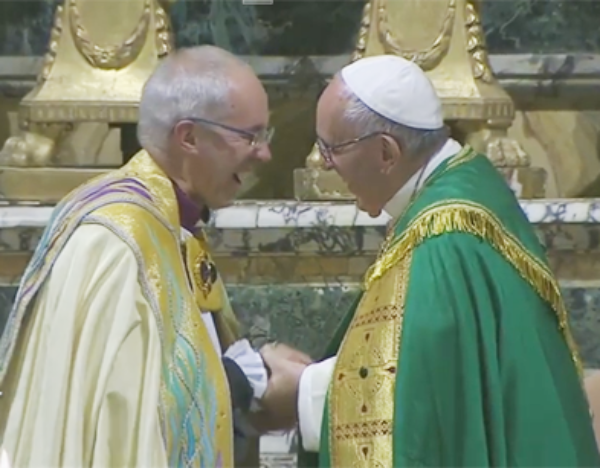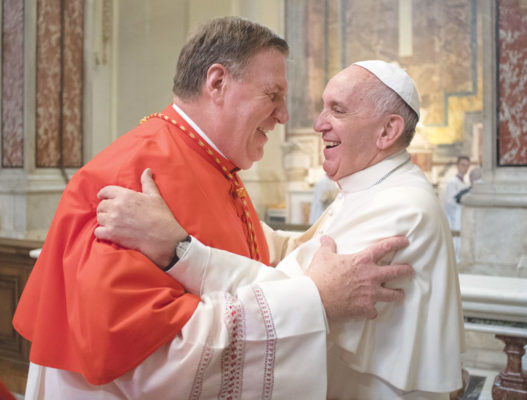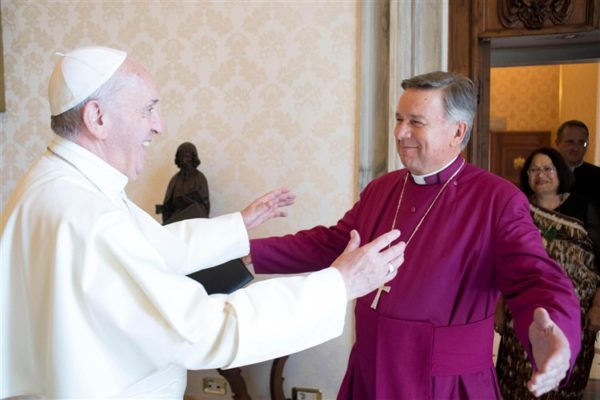“When we walk together, that is, when we meet [and] pray together, we collaborate together in the proclamation of the Gospel, and in the service to the least, we are already united.”
Pope Francis

Origins of the Foundation
In October 2016 the International Anglican-Roman Catholic Commission for Unity and Mission (“IARCCUM”) held a week-long summit meeting in Canterbury and Rome that brought together 38 Anglican and Roman Catholic Bishops from around the world to celebrate and reflect upon the deepening relationship between the two traditions and to find practical ways to give expression to their unity in ecumenical mission to the world.
The highlight of the summit was a service of Vespers held at the church of San Gregorio al Celio in Rome, at which His Holiness Pope Francis and His Grace Justin Welby, Archbishop of Canterbury jointly commissioned 19 pairs of Anglican and Roman Catholic Bishops to work together in preaching the Gospel and serving the vulnerable and marginalised. At the service, the Pope and the Archbishop committed their respective churches to work more closely together in collaborative mission and witness and signed a Common Declaration stating in part:
“The world must see us [Anglicans and Catholics] witnessing to this common faith in Jesus by acting together… For this reason we take great encouragement from the meeting during these days of so many Catholic and Anglican bishops … Today we rejoice to commission them and send them forth in pairs as the Lord sent out the seventy-two disciples. Let their ecumenical mission to those on the margins of society be a witness to all of us, and let the message go out from this holy place, as the Good News was sent out so many centuries ago, that Catholics and Anglicans will work together to give voice to our common faith in the Lord Jesus Christ, to bring relief to the suffering, to bring peace where there is conflict, to bring dignity where it is denied and trampled upon…”
The aim of the Walking Together Foundation is to help realise this vision by initiating and funding
ecumenical outreach projects addressing serious social need anywhere in the world.
ORGANISATION AND STRUCTURE
The Foundation is organised under the laws of the United Kingdom as a Charitable Incorporated Organisation (“CIO”) registered in England and Wales as Charity No. 1184811. As a registered charity, it is regulated by the U.K. Charities Commission and eligible to participate in the U.K. Gift Aid Programme.
Although the charity is organised in the United Kingdom, its activities are worldwide in scope. The Foundation supports projects in many countries, and has made arrangements through the Chapel & York Family of Foundations to allow donors from certain countries, including the United States, to make tax-deductible donations in support of the Foundation and its projects. For more details, click here.
The Foundation is governed by a Board of Trustees who are responsible for governance, fundraising and making grants in support of approved projects. Each grant is made pursuant to a Grant Agreement between the Foundation and the grant recipient which sets forth the purposes and conditions attached to the grant and the legal obligations of the recipient. To date, two projects have been approved for support by the Foundation: the St. Timothy Scholarship Programme in Malawi and the Friday Night Supper Club in Saint John, New Brunswick, Canada. The Foundation intends over time to establish a broadly diversified portfolio of projects around the world.
The Board of Trustees is assisted by an International Advisory Board whose members support the ecumenical goals of the Foundation and are prepared to lend their names in support of its activities. The International Advisory Board is co-chaired by His Eminence Cardinal Joseph W. Tobin, C.Ss.R., Roman Catholic Archbishop of Newark, New Jersey and His Grace Archbishop Sir David Moxon, former Anglican Primate of New Zealand and until June 2017 Director of the Anglican Centre in Rome and the Archbishop of Canterbury’s Personal Representative to the Holy See.



OUR AIM
The aim of the Walking Together Foundation is to help realise the vision set forth in the Common Declaration by initiating and funding ecumenical outreach projects anywhere in the world addressing serious social need, including the advancement of education, the prevention or relief of poverty, the advancement of health and the saving of lives. The Foundation supports projects that are ecumenical in nature, i.e. jointly sponsored by the Roman Catholic Church and member churches of the worldwide Anglican Communion, or by either or both of them in partnership with other Christian traditions with whom they are engaged in ecumenical dialogue.
OUR NAME
The name of the Walking Together Foundation is intended to convey the spirit of the Common Declaration, and recalls Pope Francis’ observation, in relation to Christian unity and the ecumenical dialogues, that:
“Unity is made by walking, in order to recall that when we walk together, that is, when we meet [and] pray together, we collaborate together in the proclamation of the Gospel, and in the service to the least, we are already united.”
OUR LOGO
The logo of the Foundation, a roundel encircling the Cross from which leaves and branches sprout, is intended to reflect the new growth that results from Christians of different traditions walking and working together to help those in need or on the margins of society.
Charitable Objects of the Foundation
The charitable objects of the Walking Together Foundation are:
(1) the advancement of education
(2) the prevention and/or relief of poverty
(3) the advancement of health and/or the saving of lives
(4) the relief of those in need by reason of youth, age, gender, ill-health, disability or financial hardship and
(5) such other charitable purposes (according to the law of England and Wales) as the trustees shall in their absolute discretion think fit,
in all cases for the public benefit, by initiating and providing grant funding for ecumenical outreach projects addressing serious social need anywhere in the world, and thereby demonstrating the outworking of the Christian faith.